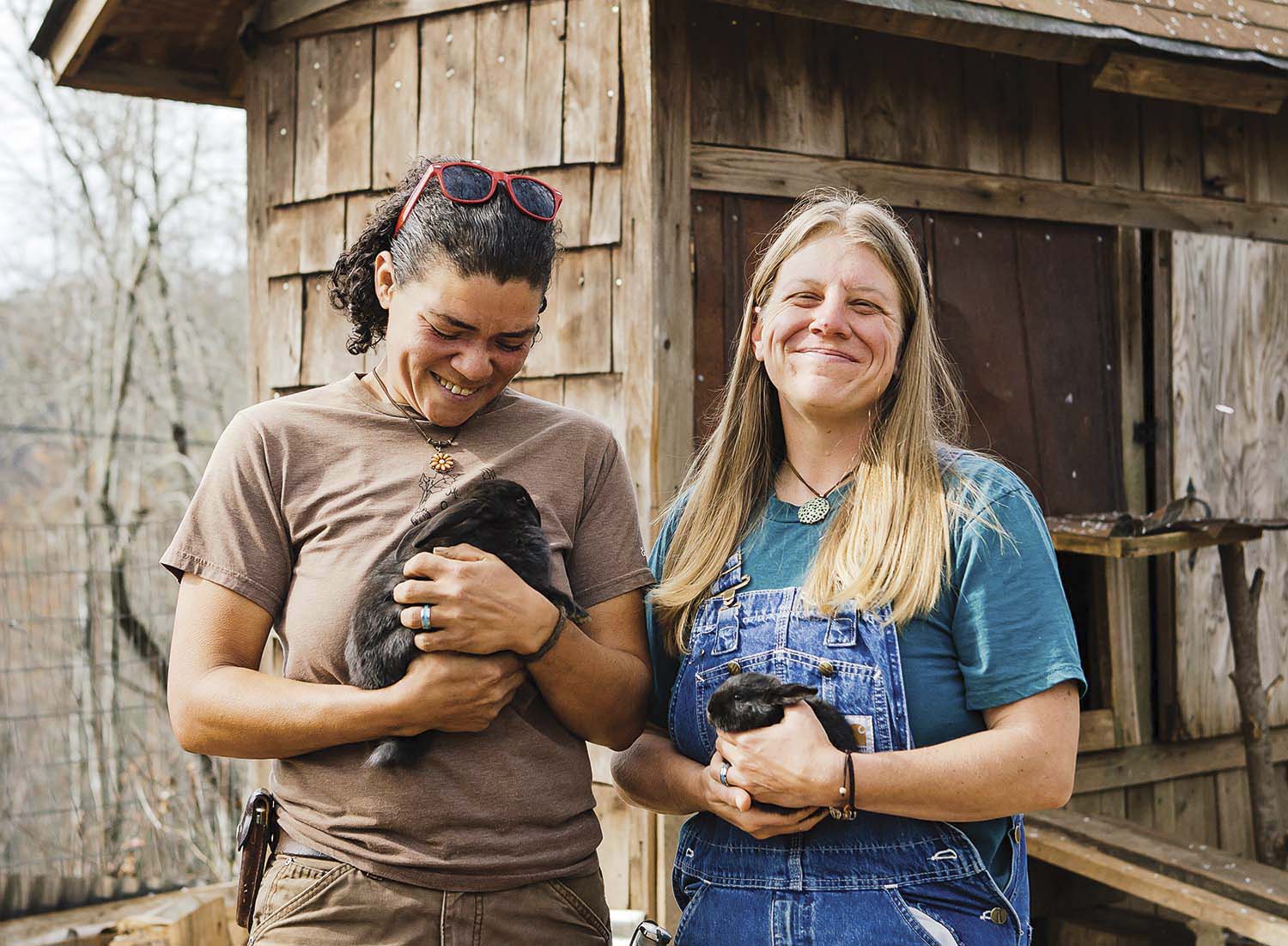
Temica, left, and Rain learned about agriculture, animal husbandry, and all other components of an off-the-grid lifestyle by trial and error. Photo by Tim Robison
When Rain Parker and Temica Ferguson quit their jobs in 2010 and headed for a farm in Transylvania County, they knew very little about the life they were about to embrace. “We were in really poor health, both of us, and didn’t have a lot of experience or education,” recalls Parker. “I didn’t know how to start a fire or grow food or harvest it.” She didn’t, she admits, really even know how to eat. A lifetime of over-processed convenience foods had left Parker just shy of 300 pounds and facing severe health issues.
“I didn’t like my job, I didn’t like where we were living,” she adds. “Things in my life had just stopped making sense. I told Mika that I didn’t know what in the world I wanted to do, but I wanted to do something very different.” (Of the two, Parker is the talker, while Ferguson is quieter and more deliberate.)
Then, in their early thirties, the couple took a leap of faith and became homesteaders, eventually developing capabilities beyond what they ever would have thought possible. Now they share what they’ve learned (and continue to learn) through immersive experiences and hosted workshops at Eight Owls Farmstead, their semi-off-grid home at the top of a mountain in Rosman, NC.

Rain Parker and Temica Ferguson bought 10 acres of foreclosure land, brought it back from ruin, and in the process transformed their lives. Photo by Tim Robison
Semi-off-grid means that although there’s no plumbing or electricity in the house itself, Eight Owls does share a small grid power building with several neighbors for a well-water pump, deep freezer, Wifi modem, and charging strips for laptops. An open-air kitchen sits under a wooden pergola (built during a women’s carpentry workshop), and all of the cooking is wood-fired. Most of what they eat now comes directly from their land (in the earliest stages of spring, this meant a heavy reliance on foraged chickweed and black walnuts).
Permaculture design allows them to waste almost nothing.
Of course, the journey to seasoned homesteading took time. Their first farm was a river-bottom rental —“easy-peasy,” describes Parker. “It was already cleared, the soil was good. You could literally stick seed in the ground and it would just grow. We got fooled into thinking we knew a little bit more than we did.”

Photo by Tim Robison
Once they purchased the land that would become Eight Owls — a 9.87-acre foreclosure with two buildings in extreme disrepair on rocky, unusable soil —they discovered just how much they didn’t know. The dirt — such as it was —washed away in the rain. They turned to YouTube for instructions on butchering chickens and milking goats (not recommended, Parker notes). Trial and error built experience, but the process was slow. “We made so many mistakes,” says Ferguson. “People ask us all the time: how did we get so brave? We just did it. And keep doing it.”
And, in the process, they shed a collective 225 pounds.

hey also shed a collective 225 pounds.
That weight-loss project — documented by Parker on the Eight Owls blog— generated attention in the community and on social media. People wanted to know how they had done it, and Parker, a teacher in her pre-farmstead life, was eager to share the knowledge they had accumulated, particularly with other women who lacked the confidence to see themselves as homesteaders. They began offering half-day workshops in 2013, and now host a range of tailored educational opportunities at various skill levels, including five-day homesteading immersions for women, paid for by donation. Students have come from as far as California and Michigan — people who, like Parker and Ferguson, want to transition away from city life, but don’t know how, as well as those who’ve already taken the plunge only to discover gaps in their skill sets.
“There is a lot of education in this area, but there’s not always a lot of inspiration and empowerment and make-you-feel-nice-and-comfortable kind of education,” explains Parker. “We want to have it be affordable and accessible to all kinds of people. I don’t want anybody to feel like they’re not accepted up here.”
The name Eight Owls was coined back on the rental farm, but has grown in significance for them since. Eights symbolize interconnectedness and infinity, and owls the allure of moving silently through the landscape, disturbing nothing, as well as the feminine, fertility, and, of course, wisdom.
“Realizing how many skills we both have — oh, that feels so good,” Parker says. “It feels like 100 years in a blink. We look at pictures before we started and I can’t even believe that was me.”
Their hope in sharing the wisdom they’ve gained is that more people —particularly those from lower-income backgrounds, like themselves — will take accountability for where their food comes from and be inspired to grow their own, even in small ways, like a community garden.
“The average bear could do this,” Parker exhorts. “You don’t need a space this big. You don’t need a lot of money. You just need the motivation. And you need to see that somebody else might have already done it — and can maybe tell you how you might do it a little easier.”
For more information about Eight Owls Farmstead, see eightowlsfarmstead.com.
